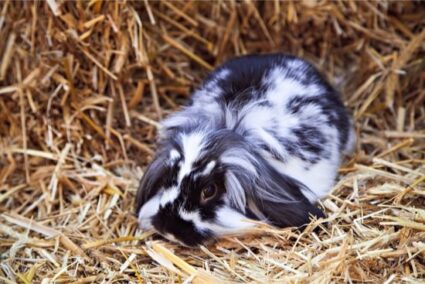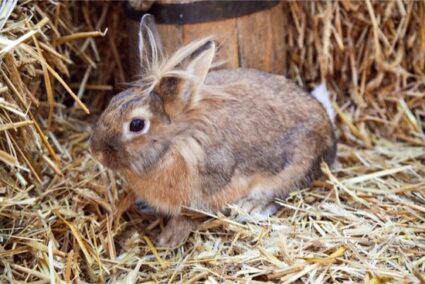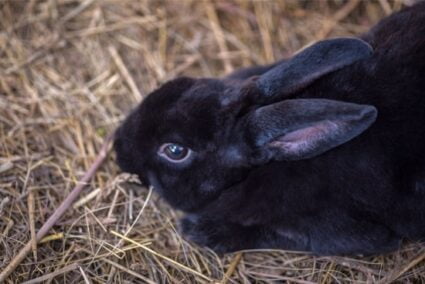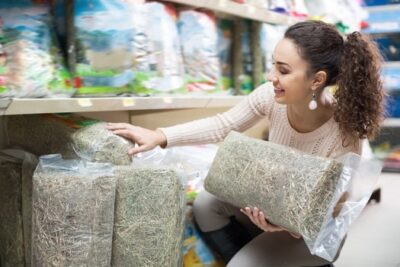A hutch and food alone aren’t enough for a baby or adult rabbit. You’ll also need to ensure your rabbit feels warm, safe, and comfortable. So, providing the appropriate substrate goes a long way to achieving this goal. The best bedding for rabbits can help to keep your pet healthy for longer.
A rabbit’s bedding must keep them safe, comfortable, and warm. Rabbits often eat their bedding, so it cannot be toxic. Shredded paper, Aspen shreds, specialist litter or pellets, and hay are all safe options.
There’s more to bedding than choosing the material. You’ll have to change it regularly, so factor the cost into the equation. Naturally, it will be worth it if your rabbit is contented and comfortable.
Do Rabbits Need Bedding in Their Hutch?
If a rabbit is tired enough, they’ll sleep anywhere. Once a rabbit has enjoyed a long exercise or playtime, they’ll often roll over and fall asleep on the spot.
Despite this, it’s advisable to arrange bedding for a rabbit. While a rabbit is sleeping, they need to feel safe and protected. Also, their body temperature will drop.
Rabbits nap frequently, but they typically enjoy one long, uninterrupted 8-hour snooze. This will be between the afternoon and early evening. They also sleep at night, when it’s cooler. Bedding keeps them comfortable on both occasions.
Bedding is not necessarily essential. Many bunnies will be just as content sleeping on a pile of hay in their hutch. Bedding helps a rabbit create specialist zones in their hutch, though. This appeals to their territorial nature.
A rabbit will also learn that bedding is for sleeping on, not eliminating. This reduces the risk of them lying in their urine of feces. Prolonged exposure to their own waste can make rabbits unwell. It can also cause the color of rabbit fur to turn yellow.
Do Rabbits Need a Special Bedroom for Sleeping?
It’s advisable to create a special sleeping area in your rabbit’s hutch. If your rabbit has dedicated areas for sleeping and eliminating, they’ll be more comfortable.
A rabbit has its main sleep in the late afternoon and early evening. This is because bunnies are crepuscular, meaning they’re most likely at dusk and dawn.
While a rabbit is trying to get some rest, the world continues turning. The sun will shine, traffic noise will fill their ears, and owners return home from work or school. This can all disturb your pet’s sleep.

A cardboard box, turned on its side, will make the perfect bedroom for a rabbit. This provides your bunny with a dark, warm and quiet place to close their eyes. They’re also shielded and enclosed, which makes a rabbit feel safe. Here’s some info on whether rabbits need the dark to sleep.
Also, remember that wild rabbits sleep underground. This arrangement mirrors the conditions of a warren. This will appeal to your pet’s natural instincts.
If you can provide your bunny with appropriate bedding, they’ll be more comfortable in this location. That will encourage them to sleep well. This, in turn, makes for a happy, healthy pet rabbit.
Do Rabbits Eat Their Bedding?
A rabbit will eat anything. Rabbits chew to explore, to amuse themselves, and to file their teeth down. This is something that must be taken into consideration when choosing their bedding.
Do not provide your bunny with bedding that will block their intestines. This means anything that could potentially expand in their stomach. Toxic materials are a strict no-no.
The occasional nibble on bedding is fine — this is just part of a rabbit’s nature. Step in if eating bedding appears to become a compulsion, though. They can quickly make them ill.
The easiest way to prevent your rabbit from eating their litter is by providing alternatives. Chew toys are critical components of any rabbit hutch.
You can throw more hay into their home. Rabbits can eat as much hay as they like without ill effect.
What Makes Good Rabbit Bedding?
Choosing the right bedding for your bunny takes some thought. For a start, every rabbit has different needs. These are based on their age, and their unique personality.
Some things are universal when it comes to rabbit bedding, though. When choosing a material, consider the following:
- Comfort. Rabbits like soft materials.
- Differentiation. Your rabbit’s bedding should be different from their litter. This will avoid confusion about where to sleep and where to eliminate.
- Absorbency. Rabbits do not sweat very much, certainly not like humans. They may have a bathroom-related accident, though. This necessitates absorbent bedding.
- Safety. Rabbits seek comfort from several materials that are harmful to them. Ensure their bedding is safe if they eat it, or breathe it in.
- Flexibility. No matter how hard you try, you’ll never get your rabbit’s bedding just right. Ensure that your bunny can move it around.
- Temperature. The body temperature of a rabbit drops while they sleep. They cannot get too hot, though. You’ll need a material that balances these needs.
- Fun. Rabbits get bored easily. Being able to make their bed, or create a nest, gives them something to do. Pick a material that allows this.
- Environmental Friendliness. Try to pick a material that’s compostable or biodegradable.
These are the generic things to consider when selecting rabbit bedding. Bunnies are different life stages have varying needs, though. You should tailor your pet’s bedding accordingly.
What is the Best Bedding for Baby Rabbits?
Finding the right bedding for young bunnies is critical to their health. A rabbit that’s younger than six months old will still have their baby fur. This means that they need to be kept warm.
Until your bunny reaches maturity, use cozy bedding that maintains a steady body temperature. This must never drop below 101 degrees Fahrenheit. As a baby rabbit will sleep more, they must also be comfortable.
Absorbency is also crucial for young rabbits. Until they learn to control their bladders, baby bunnies will pee on cue. Litter training a young rabbit is tricky, as they have such short attention spans.
This means that you’ll get through a lot of bedding until your rabbit grows up. Keep this in mind when choosing bedding. It could be an expensive six months otherwise.
What Is The Best Bedding for Adult Rabbits?
A healthy adult rabbit does not need as many specific considerations. They’ll run a comfortable temperature, and make themselves comfortable.
This doesn’t mean that you can take the decision lightly. Your bunny may gravitate toward material that is unsafe for them.
When choosing bedding for an adult rabbit, prioritize their personality. Some rabbits will have more particular needs than others.

What is the Best Bedding for Senior Rabbits?
A senior rabbit will likely spend a lot of time in bed. Their thirst for adventure and exercise will dim with age. This means that comfort should be your priority.
Older rabbits also struggle with arthritis. This means that you should make their bedding as soft as possible. Sadly, a rabbit as young as 6 can develop arthritis. The Rabbit Welfare Association elaborates further on this joint problem.
A rabbit with restricted mobility can still have a full, happy life. Just don’t expect them to be as flexible as they once were. Soft bedding is a must.
A senior rabbit may have a weaker immune system. Sickness can have drastic consequences. This means that you should avoid any potential irritants in their bedding, and keep them warm.
What Do Rabbits Like to Sleep On?
Rabbits are animals that enjoy comfort. Don’t be fooled if your rabbit sleeps on hard, cold tiles.
A rabbit may take some comfort from lying on your kitchen floor when they’re overheating. They prefer a cozy, comfortable bed overall, though. Bedding choices that your bunny will enjoy include:
- Shredded Paper. Standard, plain paper fed through a shredder is best. This way, your bunny will not eat potentially toxic ink.
- Cellulose. This low-cost, readily available material is popular with all small animals.
- Aspen. Shreds of aspen are soft and absorbent. This bedding is ideal for incontinent bunnies that may have a bedtime accident.
- Hay. Most bunnies will sleep on hay. Be careful as they may confuse their bedding with litter.
- Rabbit Litter. You could fill your bunny’s bed with specialist rabbit litter. This may confuse them. If your bunny has a litter tray, use different litter in there.
- Pellets. You could purchase bedding pellets for your rabbit. These are expensive though, so best used sparingly. Mix them with some of the above options.
- An Old Towel. If you don’t want to spend money on bedding, you could fold up an old towel. Just ensure that your rabbit does not chew and choke in the material. Read this guide to the substances that rabbits shouldn’t chew.
What Should Never Be Used as Rabbit Bedding?
What rabbits like to sleep on is one thing. What rabbits should sleep on is a different, more important, question.
Survival instincts drive rabbits, but they sometimes make questionable choices. Some materials that rabbits enjoy are dangerous. Never use these materials for rabbit bedding:
- Cat Litter. Cat litter is soft and comfortable. It can be fatal if swallowed, though. Additionally, cat litter is dusty. This dust damages rabbit sinuses.
- Straw. Hay is fine, but straw is an irritant to many bunnies. It can also dye and stain their fur.
- Sawdust. Small animals love to sleep on sawdust, as it’s so soft. Unfortunately, it also irritates a rabbit’s eyes and nose. Rabbits enjoy lying on sawdust, but it’s best avoided.
- Cardboard. Bunnies love to chew on cardboard. It is hard to digest, though. Using cardboard as bedding encourages a rabbit to eat it.
- Pine and Cedar Wood Shavings. While Aspen is safe, pine and cedar are quite the opposite. These materials seriously damage a rabbit’s liver and cause respiratory issues.
- Generic Wood Shavings. If bedding is marked as Wood Shavings, there is no way of knowing what’s inside. This can lead to serious health concerns.
- Newspaper. Rabbits like to eat paper. Most newspapers now use edible, soy-based ink. Some cheap inks are toxic to rabbits, though. It’s safer to avoid newspaper altogether.
Just because a rabbit likes to sleep on a material, it doesn’t make it safe. Always err on the side of caution when preparing rabbit bedding.
What is the Ideal Rabbit Bed?
In addition to bedding, you may wish to invest in a specialist bed for your pet. Aside from the previously discussed towel, there are several options available.
Wooden beds designed for rabbits are available. These will fit snugly into your bunny’s hutch. These are basically doll beds, so only suitable for smaller, lighter rabbits. On the plus side, they will never be mistaken for a litter tray.
Some rabbits enjoy sleeping in a hammock. These beds also double up as toys and climbing frames. It’s tough to get bedding into a hammock, though. Only take this option if your rabbit does not crave softness.
Grass mats and grass beds are a popular choice among some rabbits. They replicate the sensation of sleeping wild, and eradicate the need for bedding. This will not appeal to pampered bunnies.
We have baskets and fabric beds. These are warm and soft, so your bunny will love them. If your rabbit has free reign of the house, they’re ideal. They are typically too big for all but the largest hutch, though.
Assess your rabbit’s needs and wishes, and choose a bed based on these. The right place to sleep can make all the difference to a bunny.

Do Rabbits Need Blankets and Pillows?
As rabbits enjoy comfort, you may want to provide blankets and pillows. This is especially likely during the winter. You have to be careful, though, as bunnies can easily overheat.
If you are going to offer your rabbit a blanket, ensure it’s safe. That means:
- Never give a rabbit a blanket that contains holes. A bunny’s small paws get trapped in these gaps. This causes stress and anxiety.
- Don’t wrap a rabbit too tightly in a blanket. This can make it difficult for them to breathe. A bunny will also panic if they feel trapped.
- Don’t give a rabbit a blanket that’s too dense. Bunnies grow thicker fur in the winter. This keeps rabbits warm in temperatures as low as 32 degrees Fahrenheit. A rabbit that’s too hot will get stressed and uncomfortable.
- Your rabbit will chew on a blanket. This means that they are always a choking hazard.
Rabbits enjoy wrapping themselves in a warm, soft blanket. This is best done under supervision though, while your bunny relaxed with you.
Most rabbits do not require pillows, either. The ideal sleeping position of a bunny is with their head flat on the ground. Elevation can cause neck pain in a rabbit. If they have sufficiently soft bedding, a pillow is unnecessary.
My Rabbit Keeps Peeing on Its Bedding
If your rabbit is using their bedding as a toilet, there are three possible explanations.
- They are confusing their bedding for rabbit litter
- They are feeling insecure, and marking the bed as their territory
- They are stressed, or otherwise unwell. This could be a mental or physical ailment
If your bunny cannot tell the difference between litter and bedding, change one of them. The materials are too similar. It’s unsafe for a rabbit to sleep in puddles of their urine.
If your bunny is being territorial, question why this is the case. If two rabbits share proximity, they may still be locked in a war of attrition as to who is the alpha.
Your rabbit may even be asserting dominance over you. They smell you on the bedding, as you put it there. Play with your bunny, and groom them more. They’ll stop seeing you as a rival, and feel secure that they’re in charge.
Alternatively, if your bunny has not been spayed or neutered, this is a likely explanation. Rabbits calm down significantly after this procedure. They are much less likely to mark their domain.
Stress or illness is something that must be managed. Rabbits do not like change, so this could explain their anxiety. If they are acting strangely, such as biting or isolating themselves, see a vet.
What Is The Best Bedding for Odor Control?
Rabbits don’t sweat. They also keep themselves clean, so body odor is rarely a problem. Urine is another story, though.
Rabbit pee smells extremely strong. If your bunny has relieved themselves in their sleep, you’ll know about it. Absorbency only goes so far.
It’s not just their bed that can smell, either. Rabbit hutches generally have a distinct aroma. Odor-controlled bedding can reduce this.
If you are not keen on cleaning your rabbit’s hutch constantly, look such a product. Different materials and brands can offer odor control. Aspen flakes or shredded paper are usually the most impactful, though.
Hay tends to absorb smells, and will need to be changed regularly. Rabbit litter will mask scents, but don’t use a scented brand. These are sometimes toxic when swallowed.
You’ll know when a rabbit litter offers odor control, as it will be marked on the packaging. Green Pet Aspen Supreme Pellets, Yesterday’s News and Carefresh Complete Bedding are good examples. Here’s how to litter train your rabbit in a hutch.
How Long Does Rabbit Bedding Last?
There is a balancing act for changing rabbit bedding. You want to keep your bunny’s hutch clean. They draw comfort from familiar scents, though. Changing their bedding too frequently causes a rabbit stress.
As a rule, look into changing your rabbit’s bedding around twice a week. This doesn’t need to be part of a full hutch clean. It’s just topping up this vital area.
If your rabbit sleeps on hay, this will need to be changed more frequently. Rabbits will eat their hay throughout the day. If they are sleeping in the same area, there is a risk of mold forming.
You should also check the bedding regularly daily. Any soiled bedding should be removed immediately. Never leave rabbits wallowing in their own waste. This can lead to urine scalding.
How Much Does Rabbit Bedding Cost?
This depends on what material you use, and how often it needs to be changed. An old towel is free, and can last years. It just needs frequent trips through the laundry. Bedding materials will need to be re-purchased regularly.
Specialist rabbit litter or pellets are expensive forms of bedding. They also offer the most advantages in terms of absorbency and odor control. Plain paper is easy to acquire. If you have a shredder, then shredded paper may be the cheapest option.
Hay is theoretically a cost-effective option. You can purchase sizable amounts of hay, at very reasonable prices. You’ll have to be prepared to change it more often.
Before committing to purchasing rabbit bedding from a pet store, shop around. You will often be able to find cheaper prices online. You should also investigate farm shops, who may offer more competitive rates.
Is Rabbit Bedding Compostable?
Almost any rabbit bedding that you purchase from a pet store is compostable. This is something that you should always check when selecting bedding.
The good news is that rabbit waste is also compostable. As they live on a vegetarian diet, rabbit droppings are not harmful to the environment. Avoid allowing a compost pile to comprise more than 25% rabbit feces, though.
When the time comes to dispose of your rabbit bedding, just slide it onto the compost heap. It’s that simple. You’re keeping your pet comfortable, and helping the environment at the same time.
The bedding that a rabbit needs to flourish depends on many factors. When it comes to choosing the right material, find something that works for you both.
Your rabbit needs bedding that is comfortable, warm, and makes them feel safe. You need to find a bedding that fits in with your budget, and your schedule. If you can’t change the bedding too often, bear that in mind.
You’ll know what works for your rabbit based on their reaction. If your rabbit finds their bedding uncomfortable, they’ll sleep elsewhere. In such a situation, try something else. You’ll find the ideal formula eventually.

